Ease back into working out after having a baby with these exercises, apps and classes.
While the general guidelines are to resume exercise six to eight weeks after giving birth, each mum’s recovery may differ. Hence, take your time to fully recover. Start with assisted slow walks around the hospital after you give birth. After you’ve been cleared by your doctor, and you feel up to it, start with some of these simple exercises. When you’re feeling up to it, you can also try exercise apps with postpartum programmes or postnatal-specific exercise classes in Singapore.
What You Should Know
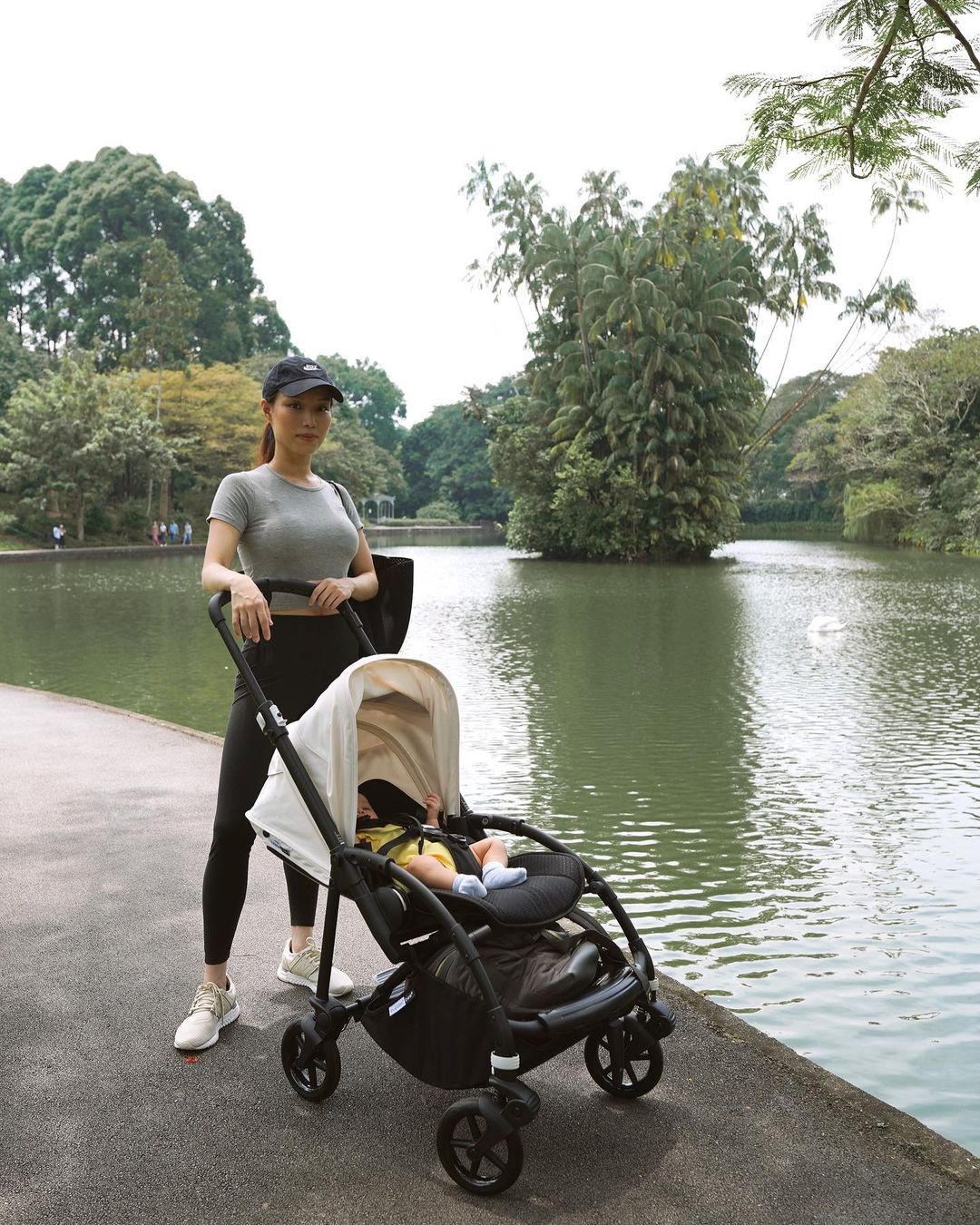
The American College of Obstetricians and Gynaecologists advises that postpartum exercise can help strengthen abdominal muscles, boost your energy, mood and sleep. Additionally, it can also help to relieve stress. Begin with a brief walk after the first three weeks or so, or when you feel ready. Try not to overexert yourself – you’ll know because your bleeding may get heavier or brighter red after a few hours of moving around.
Before starting any postpartum workouts, consult your doctor. Examples of these workouts could include modified yoga, pelvic floor and abdominal strengthening exercises. No matter which exercises you opt for, go slowly and be gentle with yourself. After all, your body is still recovering from birthing a baby. Supplement your exercise routine with lots of water and healthy snacks, especially if you’re nursing. Breastfeeding mums should express milk or feed their babies before exercising so you don’t exercise with engorged breasts.
Postpartum Exercises
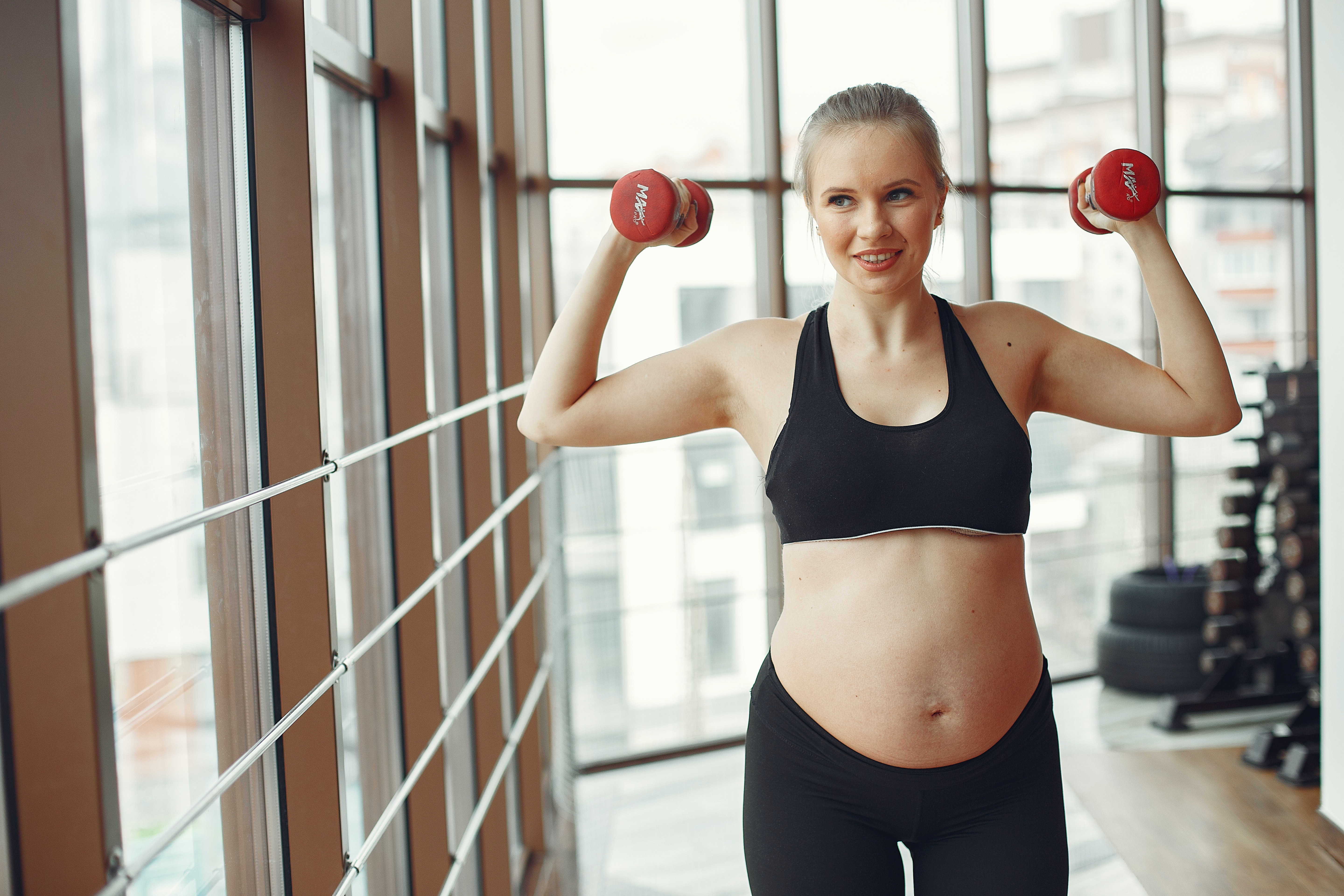
Start doing these about 10 to 20 minutes a day and then gradually work up to 30 or more minutes a day.
Neck Stretches
Drop your neck forward so the weight of your head pulls your neck and stretches. Hold for five to 10 seconds. Then, lift your head, dropping your right ear to your right shoulder, and rest for five to 10 seconds. Repeat this on the other side, then return to center. After this, relax your head backward, looking upward and holding for five to 10 seconds.
Upper Body
Using light dumbbells, do 12 to 15 reps of each exercise and do three to five rounds, once or twice a week.
Bicep Curls
Fully extend your arms at your sides, with your palms facing forward, with a light weight in each hand. Raise your forearms until your elbows are bent to 90 degrees, while keeping your wrists straight. Now, lower and repeat.
Shoulder Presses
Begin with your arms bent so that your hands are close to your shoulders. Your palms should be facing out and you should have a weight in each hand. Now, extend your arms up vertically, slowly lower and repeat.
Lateral Raises
Holding weights at your sides, with your palms facing inwards, lift your arms up and out to the side. Stop when they are extended out to the side, so your body forms a T-shape. Lower, then repeat.
Overhead Tricep Extensions
With just one weight, hold it over your head with both hands. Pointing your elbows forward, bend your arms and lower the weight behind your head. Now, extend the arms to raise the weight back up and repeat.
Bent-Over Dumbbell Rows
Grasp a dumbbell in each hand with the palms facing the body. Next, bend over at a 45-degree angle, with your back straight. Lift the weights until your arms are at shoulder height. Lower the weight slowly and repeat, staying bent for the whole set.
Core
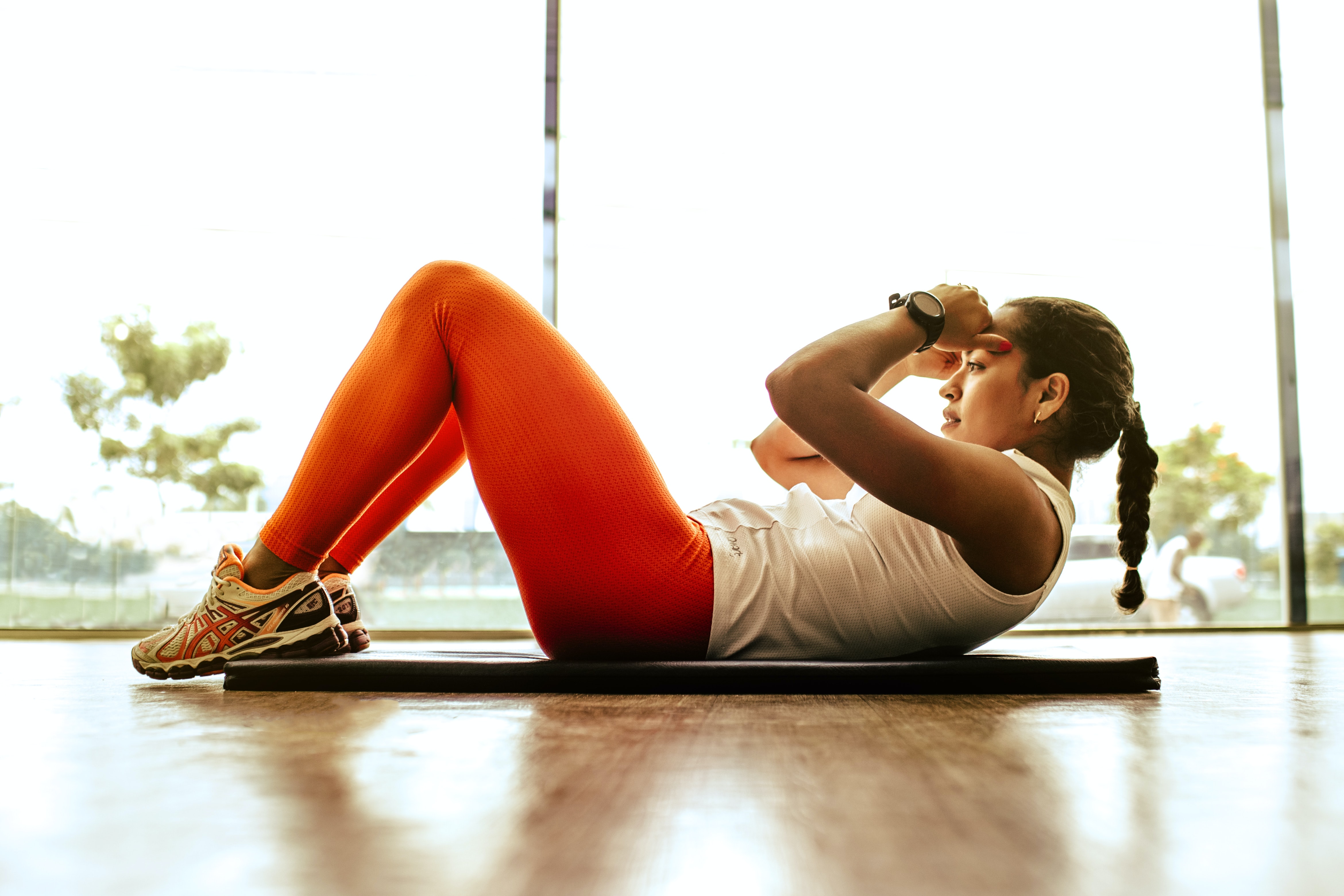
During pregnancy, your abdomen has undergone some amazing changes. While you might be concerned about toning the area, start with restorative strengthening exercises. This is especially important if you have diastasis recti, when the tissue in between the abdominal muscles thins and separates so your growing uterus has space. Aside from Kegels and other postpartum pelvic floor exercises, here are some others to restore and strengthen your core. Do these for five to 15 minutes a day.
Motherswork Recommends: Elvie Trainer for your pelvic floor
Deep Belly Breathing
For the first few days after giving birth, your organs will return to their original positions, affecting the way you breathe. Start by placing your hands low on your abdomen and breathe in until you can feel your hands move, then slowly exhale. Repeat this breathing five to eight times.
Abdominal Bracing
On your back with your spine in a neutral position, contract your abdominal muscles. This should decrease the space between your rib cage and hip bones. Imagine you’re gluing your entire spine to the ground. Hold this position for several seconds while breathing normally. Relax, and then repeat 10 times.
Pelvic Tilts
Start on your hands and knees. Use a mat and a towel to cushion your knees if they hurt. Inhale deeply while relaxing the abdomen. After this, exhale and brace your core, while squeezing your glutes and tucking in your pelvis. Aim to reduce the space between your rib cage and hip bones. Release your core and glutes, and then repeat 10 times. This also helps stretch your lower back muscles.
Curl-Up Progression
Try these modified exercises to strengthen your core before attempting sit ups. Start with head lifts, shoulder lifts and then curl-ups.
Head Lifts
First, lie on your back with arms by your sides, with your knees bent and your feet flat on the floor. Inhale deeply and relax your belly. As you breathe out, lift your head and neck, holding this for a second or two. Finally, inhale as you lower your head back down to the floor.
Shoulder Lifts
Once you can perform 10 head lifts, try shoulder lifts. Begin in the same position, but exhale and raise your head and shoulders off the floor. At the same time, reach your hands towards your knees. If this puts pressure on your neck, put your hands behind your neck. Hold this for a second or two, then lower your head and shoulders back down to the ground.
Curl-Ups
The final exercise is curl-ups, when shoulder lifts are too easy. Start in the same position, lifting your head and torso until you’re midway between your knees and the ground. Try reaching towards your knees, holding this position for three to five seconds. Next, lower yourself down to the floor and complete 10 reps.
Lower Body
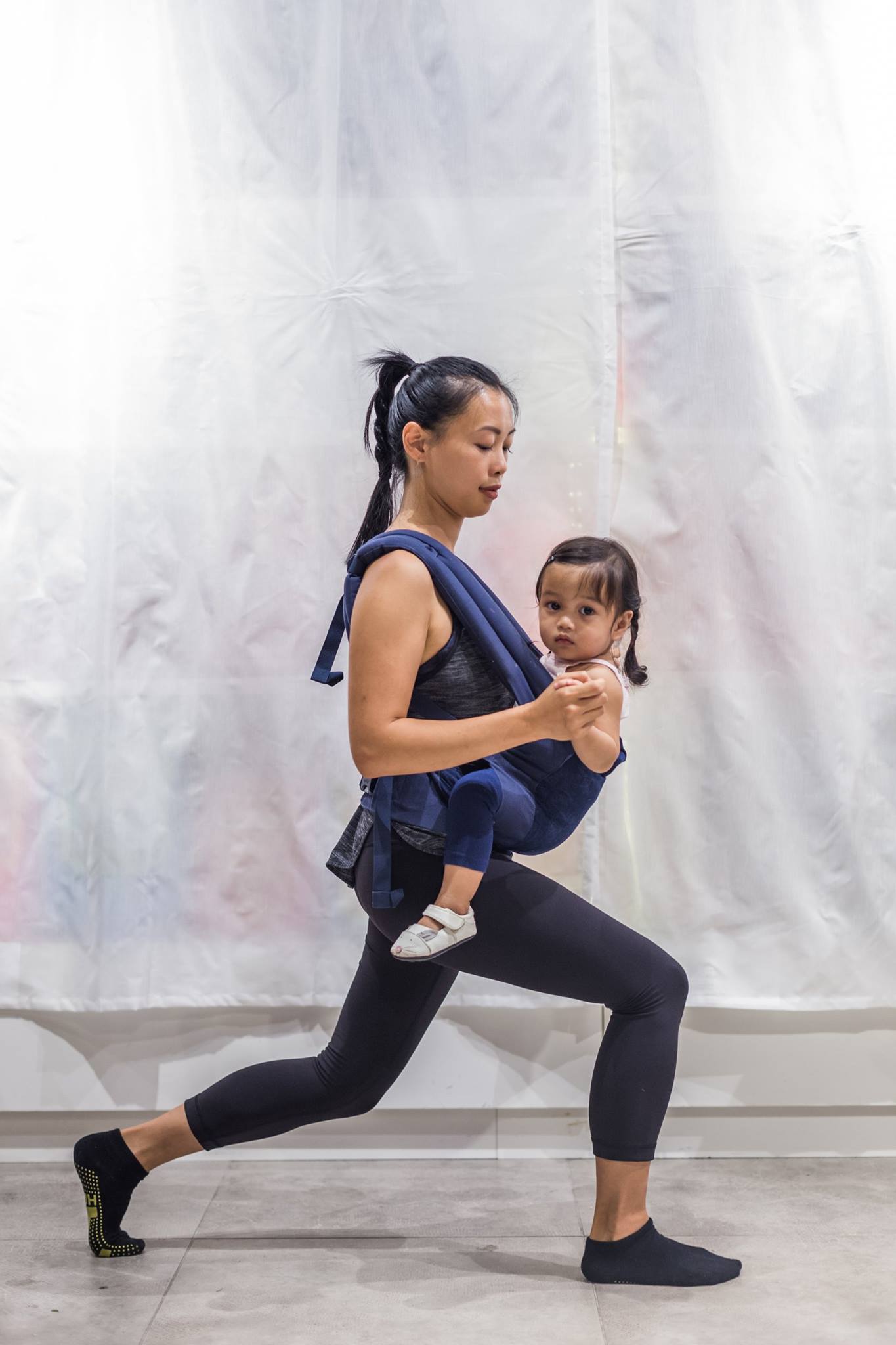
Perform 10 to 20 reps of each exercise, holding dumbbells. Do three to five rounds as a circuit, one or twice a week.
Squats
Perform a basic squat, with feet hip or shoulder-width apart. Bend your knees and slowly squat down, sending your hips back with your torso straight. Keep your head up and if necessary, extend your arms out for balance. Continue to bend your knees slightly as you straighten up.
Forward or Reverse Lunges
With legs slightly apart, step forward and lower until your front knee is almost at a 90 degree angle. Engage your core and keep your trunk straight throughout the movement. For reverse lunges, you’ll step backwards into your lunge positions. If you have trouble balancing, hold onto a chair.
Romanian Deadlifts
With legs hip-width apart, hold the dumbbells or a barbell at your thighs. Pull your shoulders back, then hinge forward from the hips, lowering the dumbbells along your legs. You should feel a stretch in your hamstrings. Then, press your hips forward to engage your hamstrings and glutes to return to standing.
Glute Bridges
Lying on your back, with your knees bent and feet flat on the floor, contract your abs and glutes. Lift your hips up, so your knees, upper back and shoulders create a straight line. Hold the position for a breath, then return to the ground and repeat.
Postpartum Exercise Classes in Singapore
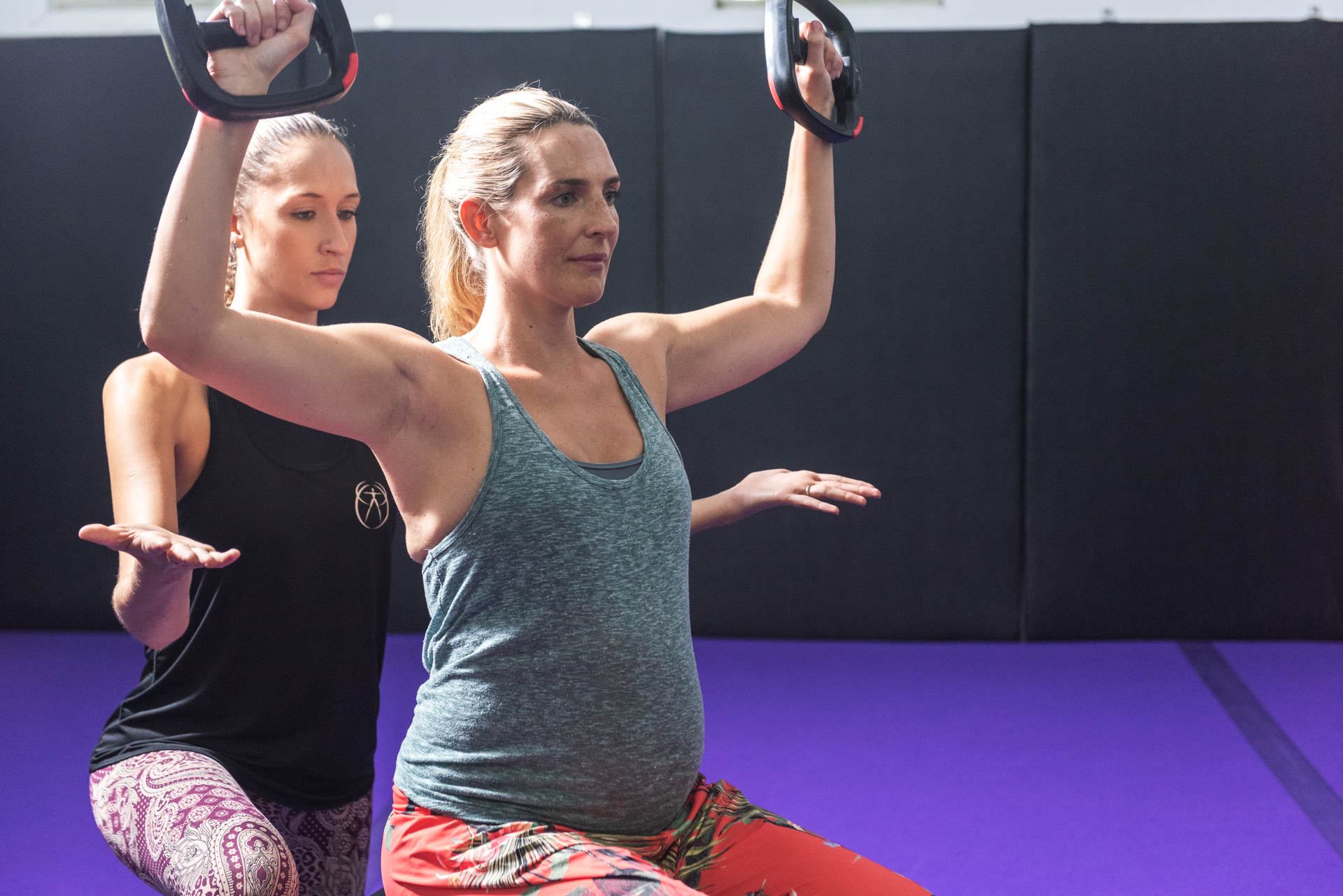
Postnatal Yoga
Enjoy 10 per cent off when you sign up for the Virtual Post-Natal classes with Lab Studios. Simply apply the promo code MOTHERSWORK10.
Postnatal Pilates
Strengthening Exercise Classes
Postpartum Exercise Apps to Do at Home
Baby2Body
Empowered Mums
Kayla’s Post Pregnancy
Kimmy Smith Fit
Relevant Reads: Postnatal Changes, Mental Health: Self-Care Habits for New Mums
This article originally appeared on Motherswork.



